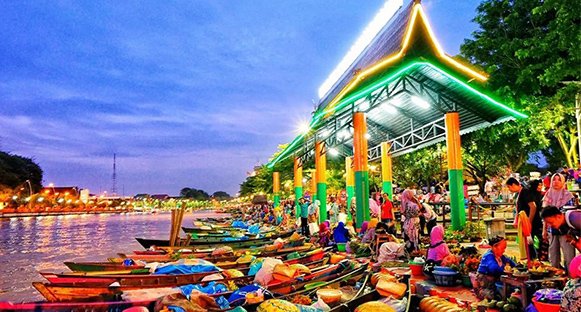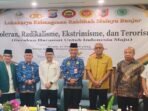Banjarmasin – The mention of the word Banjar to refer to a district / city often confuses people. In South Kalimantan, the majority of people who mention the Banjar syllable often refer to Banjarmasin City – the capital of South Kalimantan Province.
Banjarhits.com, the siberindo.co group reported, that there are three administrative districts in South Kalimantan that use the Banjar syllable: Banjarmasin City, Banjarbaru City, and Banjar Regency. The prefix Banjar as an administrative area refers to the origin of the Banjar tribe who inhabited the mainland of South Kalimantan.
Is the name Banjar for a city / regency only in South Kalimantan? In fact, not. In West Java, there is the name Banjar City. As for Central Java, there is Banjarnegara Regency. These two areas have no connection with the Banjar tribe.
As quoted from the banjarkota.go.id website, the formation of Banjar City cannot be separated from the history of the establishment of the Ciamis Regency Government, West Java Province. The series of time taken by the establishment of the Ciamis Regency Government to the formation of the Banjar City Government through the following stages:
The city of Banjar is often called Banjar Patroman. Banjar since its establishment until now has undergone several changes in status:
Banjar as the District Capital (1937 – 1940).
Banjar as the Capital of Kewadanaan (1941 – 1 March 1992).
Banjar as an Administrative City (1992 – 20 February 2003).
Banjar As a City since February 21, 2003.
The formation of Banjar, Administrative City:
The development and progress of the West Java Province in general and Ciamis Regency in particular the Banjar District area require special governance arrangements to ensure the fulfillment of the demands for development and progress in accordance with the aspirations of the community in the Banjar District area.
The Banjar District area shows development and progress with the characteristics of urban life. For this reason, the Banjar area needs to be upgraded to become an Administrative City which requires special guidance and governance, development and social arrangements.
Finally, in 1992, the Government established Banjar, an Administrative City based on Government Regulation Number 54 of 1991 concerning the Establishment of an Administrative City Banjar which was inaugurated by the Minister of Home Affairs on March 2, 1992.
Several reasons why Banjar became an administrative city, among others: The geographic, demographic, and sociological conditions of people’s lives whose development is so fast that it requires increased services and arrangements in government administration.
The formation of the City of Banjar:
The more rapid development and the demands of the people’s aspirations, the more urgent it is that the Banjar, the Administrative City be immediately upgraded to the City Government, which is in line with the demands and laws number 22 of 1999 concerning Regional Government. On the other hand, the Ciamis Regency Government together with the West Java Provincial Government pay attention to these developments and propose to the Central Government and the People’s Representative Council of the Republic of Indonesia.
The momentum of the inauguration of the City of Banjar which is followed by the inauguration of the Mayor of Banjar can be used as a historical foundation and is appropriate to become the anniversary of the City of Banjar.
As quoted from banjarnegarakab.go.id, in the Diponegoro War, R. Tumenggung Dipoyudo IV served the Mataram government, so it was proposed by Sri Susuhunan Pakubuwono VII to be appointed as Regent of Banjar based on Resolutie Governeor General Buitenzorg dated August 22, 1831 number I, to fill the position The Regent of Banjar, whose status has been removed, is domiciled in Banjarmangu, and is known as Banjarwatulembu.
Banjarnegara Regency Square, Central Java. Photo: Facebook banjarnegaraterkini
The proposal was approved. The issue of the overflowing of the Serayu River became an obstacle that made communication with the Kasunanan Surakarta difficult. This difficulty is felt to be a burden for the regent when he has to attend Pasewakan Agung at certain times at the Kasultanan Surakarta.
To solve this problem, it was decided to move the district capital to the south of the Serayu River.
The Banjar area (now Kota Banjarnegara) was chosen as the new capital city. The condition of this new area is extensive rice fields with several steep slopes.
It was in this rice field area (Banjar) that the new district capital (Negara) was established so that the name of this area became Banjarnegara (Banjar: Sawah (rice fields), Negara: Kota (city)).
R. Tumenggung Dipoyuda served as Regent until 1846, then replaced by R. Adipati Dipodiningkrat, retiring in 1878. The replacement was taken from outside Banjarnegara Regency.
The governor (government) appointed Mas Ngabehi Atmodipuro, the governor of Purworejo (Bangelan) I Gung Kalopaking in Panjer (Kebumen) as his successor and had the title Kanjeng Raden Tumenggung Jayanegara I. He was rewarded with the rank of “Duke” and a sign of honor “Bintang Mas”.
In 1896 he died and was replaced by his son Raden Mas Jayamisena, Wedana District Singomerto (Banjarnegara) and had the title Kanjeng Raden Tumenggung Jayanegara II.
From the Dutch government, Raden Tumenggung Jayanegara II was awarded the rank of “Adipati Aria” with a golden umbrella, a big gold star, an Orange Officer. In 1927 he quit, retired. His son’s successor was Raden Sumitro Kolopaking Purbonegoro, who also received the title Tumenggung Aria, he was a descendant of Kanjeng R. Adipati Dipadingrat, meaning the district returned to the descendants of the previous rulers.
Among the regents of Banjarnegara, Arya Sumitro Kolopaking, who lived three times, namely the era of the Dutch East Indies, Japan and the Republic of Indonesia, and lived and handled directly the National Revolution (1945-1949).
Well, now banjarhits.com fellas already know the differences in the five administrative cities / districts in Indonesia that use the Banjar syllable. Two districts / cities in Java have no connection with the Banjar tribe who inhabit South Kalimantan.
Anang Fadhilah








